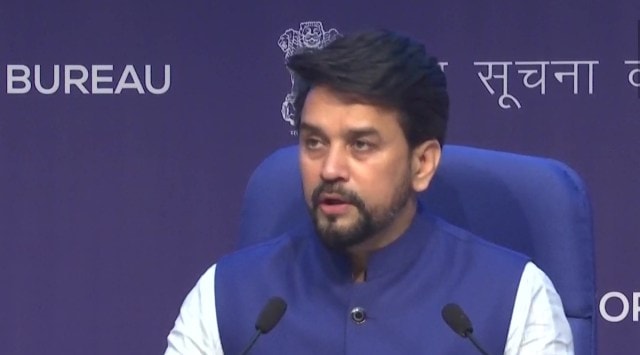Cabinet approves Rs 1,500 crore infusion in IREDA to boost renewable energy financing
This will enable Indian Renewable Energy Development Agency (IREDA) to lend Rs 12,000 crore to the renewable energy sector, Union Minister Anurag Thakur said.
 Union Minister Anurag Thakur speaks at a press briefing post a Cabinet meeting. (Photo: ANI)
Union Minister Anurag Thakur speaks at a press briefing post a Cabinet meeting. (Photo: ANI)The Union Cabinet headed by Prime Minister Narendra Modi on Wednesday approved the infusion of Rs 1,500 crore in the Indian Renewable Energy Development Agency (IREDA). This will enable IREDA to lend Rs 12,000 crore to the renewable energy sector, Union Minister Anurag Thakur said.
Briefing reporters after the Cabinet meeting, Thakur said the decision was taken in the wake the Reserve Bank of India’s (RBI’s) lending norms. He said this Cabinet decision will help IREDA to create renewable energy capacity of 3,500 to 4,000 MW.
The fresh infusion will also enhance IREDA’s net worth which will help it in additional renewable energy financing. It will also improve the capital-to-risk weighted assets ratio to facilitate its lending and borrowing operations, the government informed in a release.
IREDA is a mini ratna company under the Ministry of New and Renewable Energy (MNRE). It was set up in 1987 as a specialised non-banking finance agency for the renewable energy sector. IREDA plays a key role in the renewable energy project financing which gives confidence to the financial insitutions/banks to lend in the sector.
Apart from this, the Cabinet also approved the payment of ex-gratia amount of Rs 973.74 crore pertaining to remaining claims submitted by Lending Institutions (LIs) under Scheme for grant of ex-gratia payment of the difference between compound interest and simple interest for six months to borrowers in specified loan accounts (1.3.2020 to 31.8.2020), a government statement informed.
In the context of the Covid-19 pandemic, “Scheme for grant of ex-gratia payment of difference between compound interest and simple interest for six months to borrowers in specified loan accounts (1.3.2020 to 31.8.2020)” was approved by the Cabinet in October 2020, envisaging therein an outlay of Rs 5,500 crore, the statement said.
The budget allocation of Rs 5,500 crore was made for the scheme in FY 2020-21 and the entire amount of Rs 5,500 crore, as approved by the Cabinet, has been disbursed to State bank of India (SBI), the nodal agency under the scheme, for consequent reimbursement to lending institutions.
The estimate of Rs 5,500 crore was arrived at by extrapolating the share of SBI and other banks for the aforementioned category of loans. It was also apprised to the Cabinet that the actual amount would be known once individual lending institutions submit their pre-audited account-wise claims.
Now, SBI has informed that it has received consolidated claims of Rs 6,473.74 crore approx. from lending institutions. As Rs 5,500 crore has already been disbursed to SBI, approval for balance amount of Rs 973.74 crore was pending, the government release informed.
Cabinet extends National Commission for Safai Karmacharis tenure till 2025
The Cabinet on Wednesday extended the tenure of the National Commission for Safai Karmacharis by three years up to March 31, 2025, Thakur informed reporters in the briefing.
The National Commission for Safai Karamcharis (NCSK) was constituted on 12th August 1994 as a statutory body by an Act of Parliament for a period of three years. The validity of the Act was extended up to February 2004 twice by passing amendment bills by Parliament, according to the website of the Commission.
Since the lapse of ‘The National Commission for Safai Karamcharis Act in 2004, the Commission has been acting as a non-statutory body of the Ministry of Social Justice and Empowerment. The tenure of the Commission was being extended from time to time through government resolutions.
The mandate of the body includes recommending to the central government specific programmes of action towards elimination of inequalities in status, facilities and opportunities for sanitation workers.
-with PTI inputs
- 01
- 02
- 03
- 04
- 05































